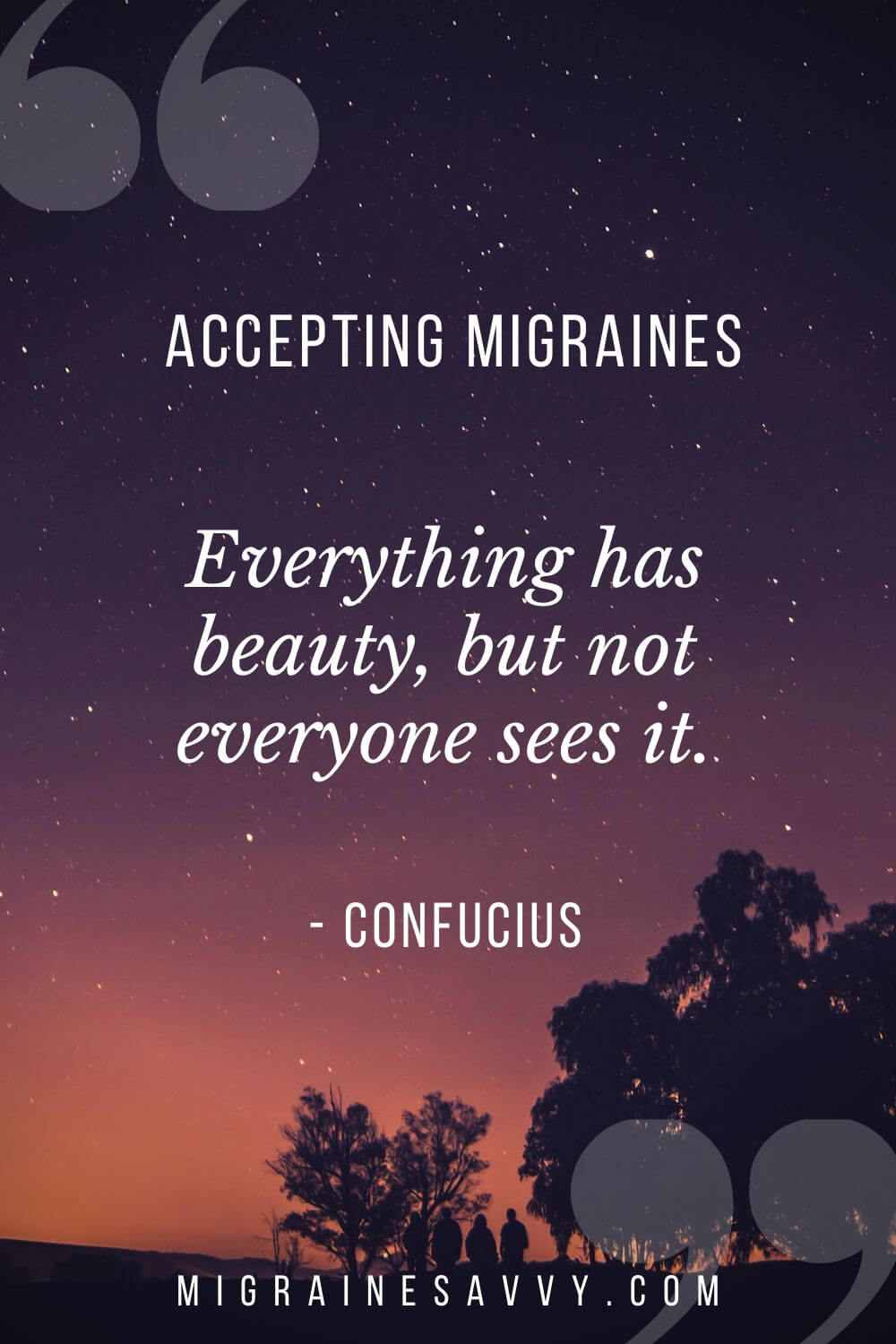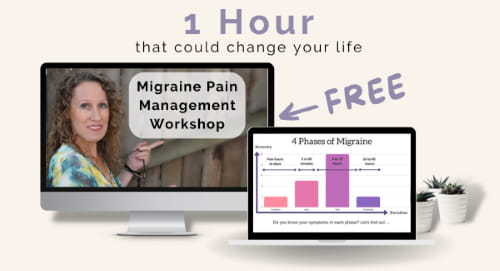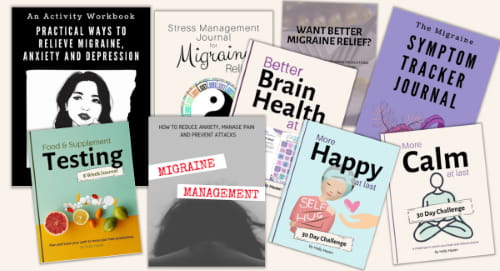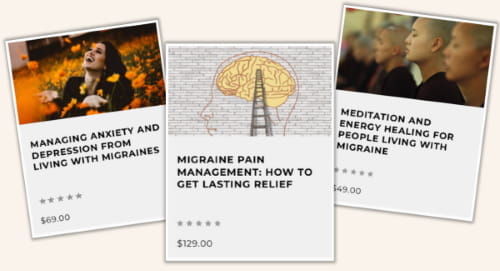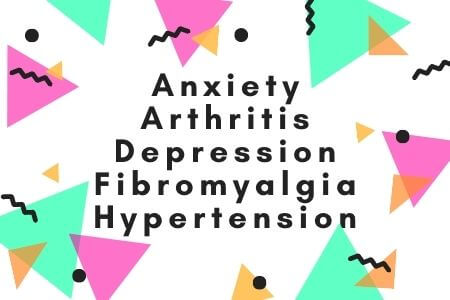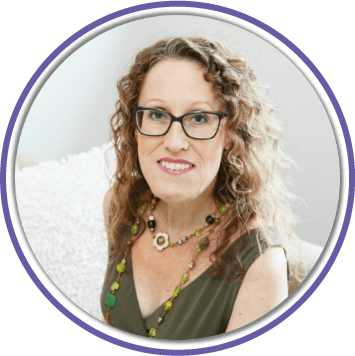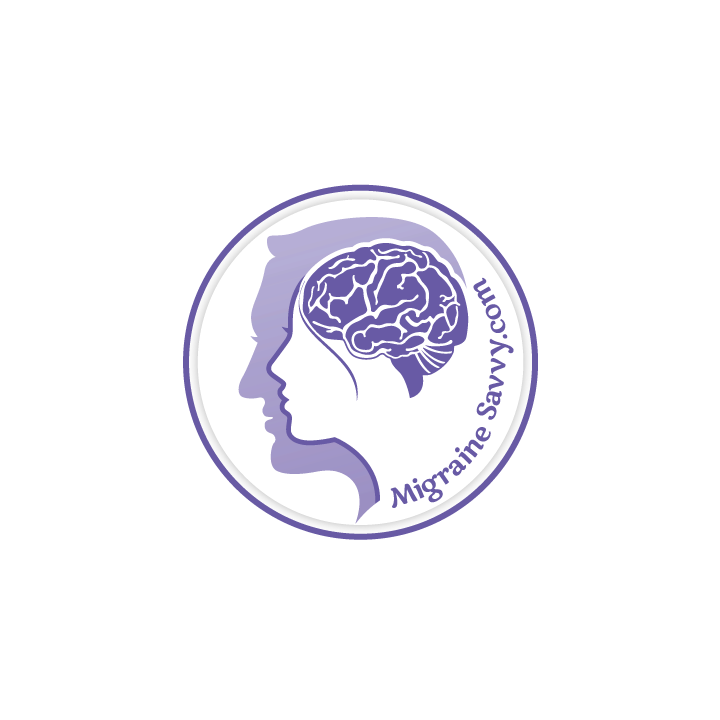- Home
- Associated Conditions
- Accepting Migraines
Accepting Migraines: What You Dare To Share With Others
I found accepting migraines very, very difficult. Nobody wants to have a migraine attack. Nobody! And no one wants them for life... that's for sure. I certainly had more fun things in mind for my life. Plus I was also quite offended by other people's responses to this being an assumed imaginary condition. Or psychosomatic.
I began to notice that what I chose to say to new people about this condition... reflected where I was really at with it all.
What do you choose to share about your migraines? How open can you be around the devastation migraines cause in your life? Let's talk about that now. As a trained counselor, I have some tips for you.
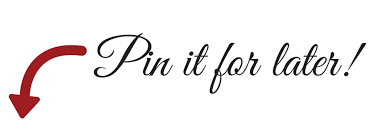
I had this amazing conversation around accepting migraines and chronic illness and what we choose to share with new people we meet or old friends we haven’t seen for a while with my friend Sam.
It was refreshing having a male perspective, since most migraineurs I talk to are women.
I found that I could more easily gauge where I was at with accepting migraines when I had to reply to someone's question "What do you do?"
Sometimes I could reply with complete inner peace, but for years I just felt angry and betrayed by my body.
Accepting that this level of pain and the losses that I would have to endure because of migraines, was really really hard for me to come to terms with. Especially when I was constantly being told that I could heal myself.
This is what Sam had to say: "what we choose to share is such a loaded question for some of us. As difficult as this subject is, it contains the potential to free us - to lighten us a bit" or to send us spiraling into self loathing and despair.
Reflecting on why we struggle with this so much can also provide a tremendous reality check on how we're doing with acceptance and self-love.
My thoughts and choices about what to share have often been dominated by feelings of insecurity. At some point I started to look more deeply at what was going on inside me. I realized that my struggle with all of this meant that I had more work to do on acceptance, deep and complete acceptance of my situation and of myself (self-love).
As more time passed with this disease, I was forced to "come out" - to share all kinds of humbling things about my health and how it disables me. And to do so in a setting where everyone I knew in my profession learned all of these things I would rather them not know. It forced me through a lot of painful and sleepless nights.
It can help to remember that, mostly, we get to choose what we share. I can choose to answer from a place of wanting to "defend" myself or I can let go of that."

Accepting Migraines - Choosing How You Respond
When people ask us what we do, it's often a casual question - almost a
greeting. Telling them that we take care of the home or that we don't
work can be enough. It can be hard to know exactly what they are asking
sometimes. If they're asking how we spend our time, we can choose how
much we want to share.
If they're asking what we do for work,
and we have had to let go of work due to this illness, we may feel the
need to defend the fact we stay at home or that we don't work. This
uncomfortable feeling inside could indicate that it’s a good time for
some introspection.
Sam made it all sound so simple.
I beat myself up for years for being sick and not 'curing' my migraines.
They were thought to be psychosomatic back then, and I still get that reaction from people today. It took me many years to respond without feeling very angry.
"Feeling a loss of identity is quite common when you have to let go of what you do for a living. It is also letting go of who we see our self as being, where our ego gets gratification. We don’t see ourselves as sick, or even as migraineurs."
When he said ego gratification, I took it to mean where we feel we contribute to society, where our job makes us feel good or important. Or just being able to just plain do what we loved to do.
Accepting migraines is not resignation, it is not giving up on finding a treatment that works, or trying new things. It is finding contentment with your whole situation. Finding a place to be in the world that feels safe.
Accepting migraines means that you don't feel angry when someone new says "what do you do?" On a scale of 1 to 10 where are you?

The Dreaded Question "What Do You Do?"
Sam continued: 'What do you do?' comes up in so many different contexts.
Here are a few that I've dealt with over the years:
- New neighbors: my answer varied depending on whether I thought I'd be in close contact with them regularly (like my next-door neighbor) or not; and how much I was feeling like sharing at the time.
Some of these times I shared my health challenges, others I didn't but I may have shared that I don't work (leaving it to them to guess whether I'm retired, unemployed, on disability, or independently wealthy). Its OK to let them assume and other times it can turn into a real opportunity to connect.
- People I used to know from my working days, asking where I work now, I would reply "I don't do that anymore (practice that profession)" and they would add ... "then, what do you do?"
Depending on how I felt either "I'm on disability" or "a little of this and a little of that." If pressed further, I have considered whether to share that I'm on long-term disability.
- Passport application or International Immigration form under "occupation" - after wrestling with this for years, I got to where I felt comfortable saying "homemaker" (not full-time, and not a very good one, and for a household of one person at the time) but that fit more comfortably than anything else I could come up with, being on long-term disability.
I find that it actually helps me to think of myself in terms of "homemaker" rather than "not working due to disability." They are both true, but I can choose (positively) which aspect of this to focus on.
I don't struggle as much with telling people that I have chronic illnesses, not many understand how disabling they are. If I'm not inclined to educate someone, I may not need to tell them anything at all about my health. For those I do care to educate, and who are interested in being educated, I can speak more openly.
I find any label to be so inadequate that I rarely use them. Aren't all of the labels prone to misunderstandings? With each of us living such different realities of the "same" condition?
Anyway, my main reason for sharing this conversation around accepting migraines was to emphasize that there can be an upside to this question of what we choose to share. With reflection, it can help us to cultivate a deeper acceptance and self-love.
It can also help us to let go of some insecurity and defensiveness. And as we get to the other side, and move towards accepting migraines and any other associated condition(s), these questions of what we choose to share can become less burdensome.
My #1 Choice in Magnesium Supplementation
Practice Tips for Accepting Migraines
Here are some tips to help you start accepting migraines.
# 1 – Get clear in your own mind what to share and what not to share. What feels comfortable, what feels too vulnerable, and what you will absolutely not share.
Think about all of your past responses so far, and what was said so you can tune into that feeling in your gut. Which responses were good and which ones felt defensive?
# 2 – Get clear on what you want to say initially. Do this by tuning into yourself after your reply “Oh I’ve been sick for 20 years, it’s been hell, how about you?” or “I’m on a disability pension, I haven’t worked in years.”
Say hello to that sinking feeling in your gut. Just sit with that sensation and work through some better responses until you feel comfortable. Read my article migraine journal for more details and ideas.
# 3 – Write them down and practice saying them.
Getting clear and having practiced responses will enable you to respond to new people and new situations without the emotional defensiveness or guilty feelings that can sometimes overwhelm us.
Process your emotions through writing. To work through some layers read migraines and depression and migraine journal.
Try These More Acceptable Responses
If your life has been turned upside down by migraine then finding a new sense of identity will be a worthwhile process. What you do is not really who you are type of thing.
Here are some socially acceptable responses (I feel) to “What do you do?” to help you with accepting migraines. Say each one out loud until you find one that feels good:
- I don’t work.
- Looking after my health is a full time job.
- I am in the health arena.
- I haven’t found healing in this yet.
- I am semi-retired or I retired early.
- I have chronic migraines so I am just focusing on helping my body through that just now.
- I am taking some time off to deal with some health issues.
- Just focusing on my health for a bit.
- I am in transition.
- I am just having a gentle day, week, and year!
- I am not what I do! Work no longer defines me! I am free! (OK maybe not this one! But it felt good to write).
You Can Retrain Your Brain So It Responds Differently
Every time you tune in, say hello and write to yourself instead of doing self defamation - you are reprogramming your brain to react differently by creating a cognitive behavior modification moving closer to self acceptance and accepting migraines.
The goal is for your brain to eventually process all these emotions by itself, and you will no longer have to write the letters to yourself, unless you start to enjoy it that is.
Please
click here
to see (and use) a great process - writing a letter to my migraines. I go through this process step by step in my course. It's free to enroll.
Until next time, be well and be pain free.
Ready to take the next step?
Choose the next step that fits where you are right now.
